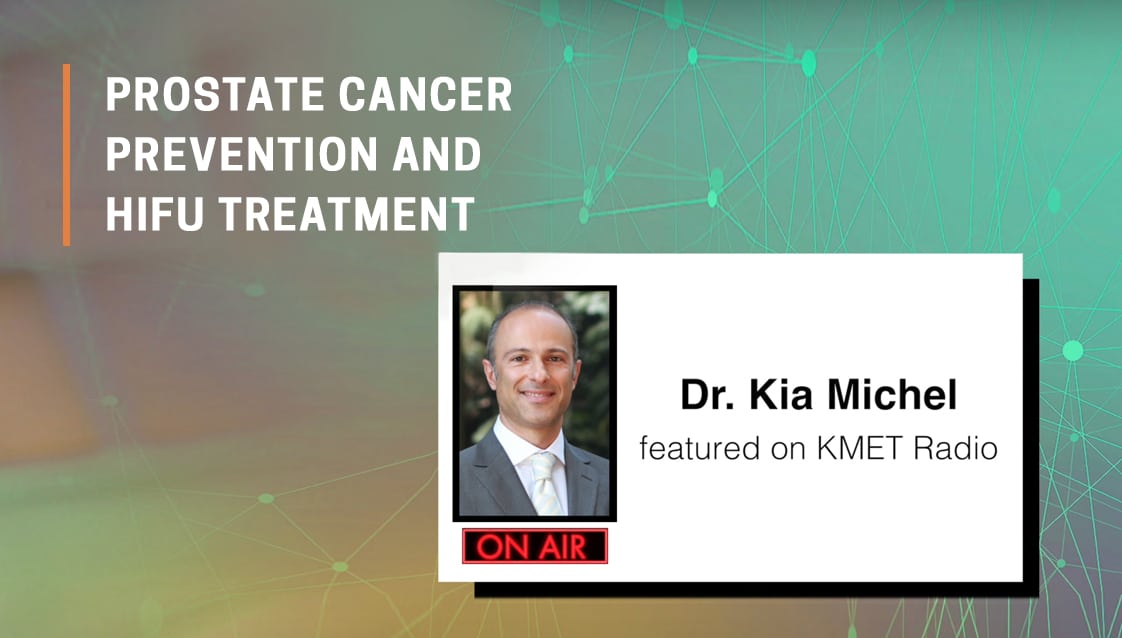Prostate Cancer Prevention
 Prostate cancer is a serious condition that affects millions of men around the world. Fortunately, there are many ways to identify and address prostate cancer in its early stages.
Prostate cancer is a serious condition that affects millions of men around the world. Fortunately, there are many ways to identify and address prostate cancer in its early stages.
At Comprehensive Urology in Los Angeles, we are dedicated to the prevention and treatment of prostate cancer. Our team of expert physicians offers personalized care to ensure prostate cancer patients can maintain a healthy, active lifestyle. At the Comprehensive Urology in LA, Dr. our team of urological experts specialize in diagnosing, treating, and preventing prostate carcinoma. In addition to the innovative and state-of-the-art technologies used at our center, our treatment options also include holistic services and nutritional measures.
To learn more about complementary prevention programs provided at Comprehensive Urology of LA, please contact us today!
What Causes Prostate Cancer?
There are many reasons why an individual may experience prostate cancer. These include:
- Genetic predisposition
- Dietary factors
- Environmental exposures
- Psychological and emotional stressors
Although there is no telling which of these factors may make an individual more susceptible than others to prostate cancer, testing is available. Common prostate cancer tests include:
- Blood test
- Rectal exam
- Prostate ultrasound
- Perfusion dynamic MRI of the prostate
- MRI fusion biopsy
The Comprehensive Urology team will discuss aforementioned tests and perform them as needed. Testing options vary from patient to patient, and one of our expert urologists will meet with a patient to determine which prostate cancer tests are required.
Is Prostate Cancer Preventable?
Over the past several decades, the importance of prostate cancer prevention in the forms of grading, staging, and screening has been clearly identified. By being screened, patients are being diagnosed at a much earlier stage of disease, which makes their chances of being cured dramatically higher when compared to patients who do not undergo screening. This approach has resulted in significantly better outcomes for men who develop cancer.
However, more and more men would like to know how they can possibly help themselves avoid prostate cancer development in the first place. The importance of preventative approaches is becoming more and more paramount. Understanding that there are numerous elements that can affect a man’s potential of developing cancer is an important step. By being able to identify some of these variables and by being able to take active measures, men are in a position to help themselves minimize their future risk of the disease.
Although more studies are necessary to clearly identify the relationship of such variables and their overall effect prostate cancer prevention, most men are willing to take relatively simple steps with the hopes of minimizing their overall risk of developing the disease. One such step is proper nutrition, which can reduce the risk of prostate cancer over the long term.
Prostate cancer is curable if an individual identifies the condition in its early stages. However, men also should strive to avoid prostate cancer in the first place, and there are many preventative measures that they can use to achieve their goal.
Understanding prostate cancer risk factors is key. The primary prostate cancer risk factors are:
- Age: As a man gets older, his risk of developing prostate cancer increases accordingly. On average, a patient’s age at diagnosis of prostate cancer in the United States is 69 years. Among men over the age of 69, prostate cancer is more common than any other cancer.
- Race: African American men are more prone than others to develop prostate cancer. They are also more likely than others to die from prostate cancer. Comparatively, Asian men have the lowest risk of prostate cancer.
- Family History: A man may be more susceptible than others to prostate cancer if his father, brother, uncle, or another blood relative previously received a prostate cancer diagnosis.
- Location: American men who live north of 40° latitude (north of Philadelphia) are more prone than others to dying from prostate cancer. This may be due to the fact that these men are less likely than others to be exposed to adequate sunlight at certain points during the year, which lowers their vitamin D levels.
Some of the best ways to prevent prostate cancer include:
- Maintain a Low-Fat Diet That Is Rich in Vegetables and Fruits: Vegetables and fruits are key sources of nutrients and vitamins that have been shown to help reduce the risk of developing prostate cancer.
- Exercise Regularly: Exercise helps people alleviate stress, improve their health and well-being, and bolster the immune system.
- Moderate Dairy Intake: Studies indicate men who limit their consumption of milk, yogurt, and other dairy products have been able to lower their risk of developing prostate cancer.
- Avoid Flaxseed Oil: Flaxseed oil stimulates the growth of cancer; fortunately, olive oil is a viable flaxseed oil alternative and contains plenty of vitamin E.
- Add Fish to Your Diet: Fish is loaded with omega-3 fatty acid, which helps reduce the risk of prostate carcinoma. Furthermore, it may be beneficial to substitute red meat, which creates carcinogens when charred or blackened, with fresh fish.
- Drink Green Tea: Research shows men who consume green tea regularly are less likely to develop prostate cancer than those who do not.
The Prostate Cancer Institute employs prostate cancer prevention experts who are happy to assist patients in any way possible. Our team offers valuable prostate cancer prevention tips and treatments to ensure patients can limit the impact of prostate cancer.
Screening for Prostate Cancer
Prostate cancer screening is paramount, as it enables men to identify and treat prostate cancer in its early stages. However, the right time to begin prostate cancer screenings varies based on the patient.
For men who have a family history of prostate cancer, screenings are recommended starting at age 40. Meanwhile, African American men should start prostate cancer screenings at age 45. For men who do not have a family history of prostate cancer and are not African American, prostate cancer screenings are recommended beginning at age 55.
Men between the ages of 55 and 69 should consult with a doctor. That way, a patient and doctor can work together to determine the right time to start prostate cancer screenings. For patients who are over the age of 70, prostate cancer screenings may be risky. As such, prostate cancer screenings are generally not recommended for men over the age of 70.
A urologist is happy to teach a patient about prostate cancer screenings and perform a prostate cancer evaluation. If a urologist identifies prostate cancer, he or she will work with a patient to determine the best way to treat this issue.
Radio Interview With HIFU Prostate Cancer Specialist
Schedule a Prostate Cancer Consultation with the Prostate Cancer Institute Today
Prostate cancer is complex, and working with highly trained physicians to identify and address this problem is paramount. The Prostate Cancer Institute educates patients about prostate cancer, responds to their concerns and queries, and offers expert prostate cancer prevention tips and treatments. To schedule a prostate cancer consultation, please contact us today at (310) 341-2557.
